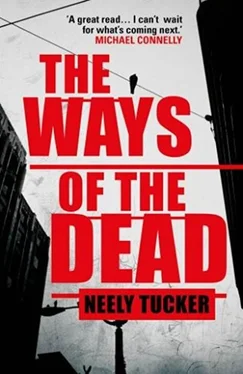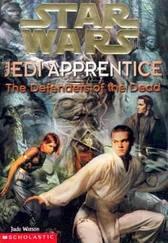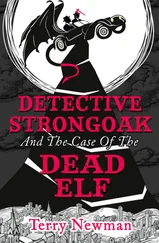“You don’t like the mob for this?”
“Nobody from a professional organization would pull this. Even Junior knows better. Not that I’m calling his outfit professional.”
Sully came and looked over his shoulder at the paper.
The story he and Chris had written anchored the right side of the front page, the traditional spot for the lead news story of the day. The picture dominating the middle of the page was of the crime scene, the yellow police tape across the front of Doyle’s Market, two young white girls weeping and embracing just inside the tape. The headline: “Chief Judge’s Daughter Slain.”
“Massive Manhunt for Three ‘Persons of Interest’” was the deck head.
Tony had put the throat slitting in the third graf.
The related stories inside took an entire page and a half. There was the story Sly had been reading from, the judge’s bio and his recent cases, and another story about Sarah, quoting friends and schoolmates. Christ, Sully thought, they must have been finding the kids on deadline. Hello, Mrs. Wealthy White Lady, may I please talk to your son Brandon? Hey, Brandon, I’m a reporter and I’m sorry to tell you your buddy Sarah is dead, yeah really, it’s terrible, I can’t even imagine what you must be going through, so… what was she like in class?
He went to the coffee table and pulled his shoes out from underneath and sat down to put them on.
“Should I be looking for them three today?”
“If you want to waste your time.”
“Jesus. Okay. So, then, who works with a knife?”
“People who ain’t got a gun.”
“We’re behind on this, brother.”
“I know it.”
“Then let’s move. You got somebody who can run me down to Stoney’s?”
“Lionel’s at the end of the block. Tell him to get on back.”
Sully walked out of the basement door and heard Sly bolt it behind him. He came to the top of the steps, the mist chilling his skin. Down at the corner of Rock Creek Church and Warder he saw Sly’s 1982 Camaro, black over gold. When he got within thirty feet of it, Lionel materialized, coming out of the corner market, head down, face obscured by a White Sox hat. The car alarm beep-beep ed and Sully opened the door and sat down, heavy, in the passenger seat.
Lionel talked like he had to pay by the word, and Sully wasn’t in the mood this morning himself.
They passed a couple of miles in silence, the easy rhythm of Saturday morning traffic going by, making good time.
“This’s going to be some shit,” Lionel said finally.
“He seems pissed,” Sully agreed.
“When he’s like that? Nothing good happens.”
“I’ll keep it in mind.”
Lionel pulled into the narrow street and stopped in front of Stoney’s. The bike, a 1993 Ducati 916, sat alone, rear tire at the curb. He’d bought it, cash, through some highly creative expense reports during the war. It was known as filing for overtime.
There had been a million ways to do it, the easiest of which was telling your employer that the bureau car in Sarajevo had been stolen, backed up with a police report. In reality, Sully and half the foreign press corps had kicked $500 per report to a compliant officer, who would complete the form-amazing, the bureaucracy that kept functioning-and then you sold your car, at an exorbitant price, through your interpreter (another $500 tip) to an aid agency or the UN or the highest bidder. You’d pocket $18,000 to $25,000 and change.
When he straddled the bike and cranked it, the engine rumbled into life. The seat was still soaking wet and cold, a clammy hand grasping his crotch. He let out on the clutch, twisted the throttle, leaned over the gas tank, and lifted both feet off the ground. The rear wheel spun on the wet pavement and found traction, the bitch hitting seventy before the first light.
***
His place was small, narrow, a brick kiln in the summer, a 107-year-old row house on Capitol Hill, on Sixth Street. It was spare and decorated with pictures and carpets and paintings and things from his overseas postings. Persian rugs he’d bought in Beirut and a teak dining room table that had been made from railroad sleeper cars in what had been Rhodesia. The dishes and plates all came from a tiny ceramic studio in Warsaw. He’d bought the entire set on a freezing winter morning just after the fall of the Wall in Berlin. He’d thought, at the time, it might help domesticate him. There were post-impressionistic paintings from the Netherlands in a narrow hallway, and two framed pieces of mud cloth he’d bought at a market in Nigeria.
Nadia’s photograph, a portrait he’d taken of her on a snowy morning in Sarajevo, was the only thing that passed for a picture of family or a friend. The black hair, long and only partly pulled back out of her eyes, no makeup, her prominent nose, the full lips. She was wearing jeans and one of his Chart Room T-shirts, from the bar where he’d worked in New Orleans. He had been leaving Sarajevo that morning for a reporting trek in the countryside and she’d walked him down the steps from her third-floor flat. She’d tugged on the clothes after their hurried predawn roll in the hay, he scrambling to meet the other reporters at the Holiday Inn before they left, and when the door swung open she had stepped into the snow and crossed her arms, shivering. When he’d brought the camera up, she’d playfully put her index finger to her pursed lips, making the sign to hush, don’t tell, don’t let anyone know… It was in a teak frame beneath the lamp by the couch.
This morning, he grabbed a Corona from the fridge, stripped off, got in the shower, and thought of what to tell his bosses he was doing today-particularly before they called him with some bullshit assignment. The water beating down on his back, his skull, he decided that he believed Sly that the three suspects were bogus, and he did not want to get sucked into that if it was going to be a dead end later on. He’d let Chris and Jamie run with that. The long money? That was on nailing the actual killer. For that, he was going to need street intel, and for that, he needed to be hoofing it around Princeton Place, keeping Sly close, kicking over rocks, looking for a man with a knife. So until you had that, stall.
He got out of the shower and called R.J. at home. “I’m going to write you a moody neighborhood profile,” Sully said. “Swing sets in the rain, poverty, meanness.”
“Bukowski,” R.J. said, not missing a beat. “Pure Bukowski.” Sully pictured R.J. in his living room, coffee in hand, up since dawn and his morning hike through Rock Creek Park already finished. He could hear Elwood, his partner for a quarter century, noodling on their baby grand, but he couldn’t place the tune. “I love it,” he continued, after a sip on the coffee. “But don’t you want in on the manhunt?”
“Nah,” Sully said, going with Sly’s word on the three suspects being a dead end, but not coughing that up just yet. He’d take the high road. “Not my turf. Don’t like bigfooting.”
“We may pull you into it later. But we could use the neighborhood scene for atmosphere. Think 1-A here. We’ve got to own this one. For tomorrow, yes?”
“Yes.”
“I’ll let the desk and photo know. Go, boy, go.”
Sully wolfed down a turkey and cheese sandwich standing up in the kitchen, in front of the sink, looking out at his postage stamp of a backyard. The cherry tree-he’d planted it when he bought the place, before his first foreign posting-was shimmering in the mist, leaves wet and dripping, spreading over the lawn. Three weeks every spring, it was a pink cloud. He went to the bedroom and pulled a light sweater over his head and stepped into black slip-on shoes. He got a slender backpack and put a notebook, a camera, a recorder, and a couple of pens inside. There was a moment of hesitation; then he went to the closet, the top shelf, a small box. He pulled out the Tokarev M57, the Zastava, ancient but accurate, that the commander had given him after the night on the mountain, him blown to shit. He checked the clip, then got his backup cycle jacket, the one for bad weather, and tucked the pistol into the right interior pocket. Because if he’d had a pistol when that night started instead of when it ended he wouldn’t look or walk like he did now.
Читать дальше












